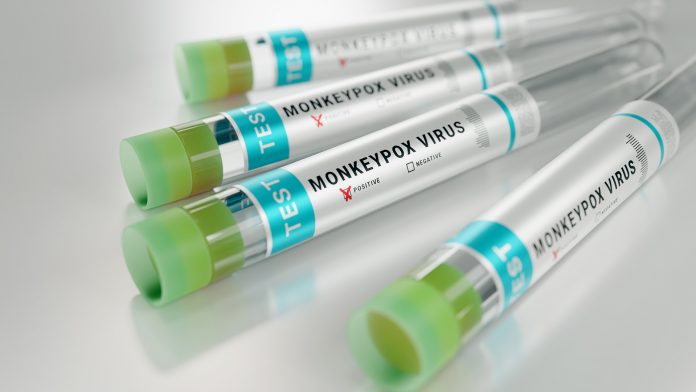
Researchers have identified a severe, necrotising form of monkeypox with high mortality in immunosuppressed people with advanced HIV.
Most monkeypox infections in the current outbreak have occurred in gay, bisexual, and other men who have sex with men. Of all people diagnosed with the disease in 2022, 38-50% also live with HIV. Most people with HIV receive treatment and can live healthy lives.
Research from previous studies has suggested that monkeypox infection may have more severe effects in people with advanced HIV. Before this research, there has been no major global study to examine this further.
The study titled ‘Mpox in people with advanced HIV infection: a global case series’ was completed by an international collaboration of clinicians led by Queen Mary University of London and the Fight Infections Foundation.
Severe monkeypox can be deadly
The researchers examined 382 people with advanced HIV and monkeypox. A total of 27 people died of monkeypox during the study. Certain participants were placed into a separate group. These participants had a very severe form of monkeypox, characterised by widespread, large, necrotising skin lesions; high rates of severe infections; and unusual lung lesions in some cases. This severe form of monkey disease carries a 15% mortality in people with advanced HIV disease and immunosuppression. All 27 deaths occurred within this group.
The study proved that the disease behaves differently in people with advanced HIV and immunosuppression. The researchers have called for their findings to be added to AIDS-defining disease definitions set by the Center for Disease Control (CDC) and the World Health Organization (WHO), which clinicians use to guide management worldwide.
AIDS-defining conditions are a group of diseases that are serious and life-threatening for people with advanced HIV-related diseases. Someone is classified as having advanced HIV-related disease when their CD4 cell count, a cell type in the immune system, is less than 200 cells/mm3. A healthy person with or without HIV should have a CD4 count of over 500 cells/mm3.
People with advanced HIV should be prioritised
According to the researchers, adding this severe form of monkeypox to the existing list of AIDS-defining conditions can help healthcare professionals to protect immunocompromised people who are most at risk of dying from monkeypox.
Most monkeypox-related deaths have occurred in countries where their levels of HIV diagnosis are low. High numbers of death have also occurred in countries without universal access to antivirals and intensive care units.
“Our success in curbing new monkeypox infections may have led us to think monkeypox is no longer a cause for concern. This data highlights that monkeypox remains a significant threat to the lives of people with advanced HIV, a group who may not be getting the healthcare they need, including monkeypox vaccination,” said Matthew Hodson, Executive Director of NAM aidsmap.
“We describe a severe form of monkeypox affecting mostly young men who have sex with men, and which results in death in 15% of people with advanced HIV. When clinicians recognise necrotising skin lesions and/or lung involvement, they should use a differentiated clinical pathway and an intensified approach. Also, health authorities should prioritise the vaccination of people living with HIV, particularly in countries with low levels of diagnosis or without universal free access to antiretroviral treatment,” concluded Oriol Mitjà, first author and Associate Professor of Infectious Disease and Global Health.










